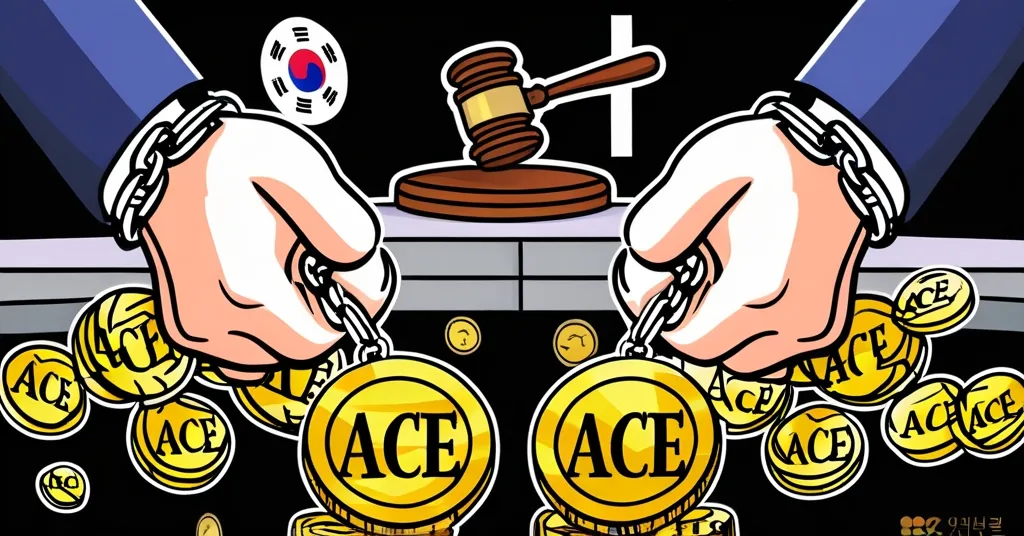South Korea Arrests Two for Crypto Manipulation: Can New Laws Curb Market Abuse?

Can South Korea’s New Crypto Laws Stop Market Manipulators in Their Tracks?
In a landmark move, authorities have arrested two South Korean men, Lee and Kang, for allegedly manipulating the price of the Fusionist token, ACE, on the Bithumb exchange. This case marks the first to be fast-tracked under the country’s new Virtual Asset User Protection Act, signaling a robust regulatory crackdown on crypto market manipulation.
- Two South Koreans arrested for manipulating ACE token on Bithumb.
- Allegedly made $5 million in profits using fake orders.
- First case fast-tracked under the new Virtual Asset User Protection Act.
- ACE’s trading volume spiked before declining 75% over the year.
The Arrest: Lee and Kang’s Scheme
Lee, a 33-year-old CEO of a virtual asset operator called M, and Kang, a former employee of M, stand accused of using fake buy and sell orders to artificially inflate the price of the Fusionist token, ACE. This form of market manipulation, where individuals use deceptive tactics to alter the price or trading volume of an asset, allowed them to sell approximately 1.22 million ACE tokens, netting them a hefty sum of around $5 million (7.1 billion won).
The Virtual Asset User Protection Act, effective from July 19, 2024, aims to safeguard users’ investments and regulate unfair trading practices like price manipulation. By fast-tracking this case, the South Korean Financial Services Commission has made it clear: they’re not playing around when it comes to ensuring the integrity of the crypto market.
Impact on the Fusionist Token
The manipulation had a dramatic effect on ACE’s trading volume, which surged nearly 15 times to about 2.45 million tokens on July 22, 2024. However, the token’s value has since taken a nosedive, plummeting by almost 75% over the year. As of now, ACE has only dipped slightly by 0.3% in the past 24 hours and risen by 1.1% over the past week, with a market cap of approximately $92 million and a fully diluted valuation of $319 million.
ACE, the native token of the Fusionist blockchain-based gaming project, is exclusively listed on Bithumb in South Korea. It debuted in August 2024 at around 3,722 won ($2.53). Bithumb, one of the country’s leading crypto exchanges, has been striving to meet international financial regulatory standards, reflecting the broader industry’s commitment to enhancing security and user protection.
South Korea’s Regulatory Response
This case’s swift handling under the Virtual Asset User Protection Act showcases South Korea’s commitment to protecting investors and maintaining market integrity. The Act not only regulates unfair trading activities but also empowers financial regulators to supervise and sanction Virtual Asset Service Providers (VASPs).
The Seoul Southern District Prosecutors’ Office’s Virtual Asset Joint Investigation Team, in collaboration with the Financial Services Commission, has demonstrated a zero-tolerance approach to market manipulation. This aggressive regulatory stance could serve as a deterrent to potential scammers, but it also raises questions about the balance between innovation and regulation in the crypto space.
Broader Implications for the Crypto Market
The arrest of Lee and Kang serves as a stark reminder of the challenges facing the cryptocurrency market. While the promise of decentralized finance and blockchain technology remains strong, incidents like these highlight the necessity of robust regulatory frameworks. The crypto community must navigate a fine line between fostering innovation and ensuring investor protection to maintain the long-term sustainability of the market.
Experts in the field believe that the Virtual Asset User Protection Act could set a global precedent for crypto regulation. The Financial Services Commission expects the Act to establish a foundation for user protection and maintain a sound order in the virtual asset market. However, some argue that stringent regulations might stifle innovation and deter legitimate traders from participating in the market.
On the other hand, the industry has shown a commitment to self-regulation, with organizations like the Digital Asset Exchange Alliance (DAXA) and 20 virtual asset exchange service providers developing best practice guidelines. This collaborative effort could complement regulatory measures and enhance overall market integrity.
Key Questions and Takeaways
- What was the method used for price manipulation?
The method involved submitting fake buy and sell orders to artificially inflate the price of the Fusionist token, ACE.
- How much profit did the perpetrators allegedly make?
The perpetrators allegedly made a profit of approximately $5 million (7.1 billion won).
- Why is this case significant in South Korea?
This case is significant because it is the first to be fast-tracked by the South Korean Financial Services Commission under the Virtual Asset User Protection Act, signaling a strong regulatory stance against market manipulation in the crypto space.
- What impact did the manipulation have on the ACE token’s trading volume?
The manipulation led to a spike in ACE’s trading volume by nearly 15 times, reaching about 2.45 million tokens in one day on July 22, 2024.
- What is the current market performance of ACE?
At the time of writing, ACE has dipped slightly by 0.3% in the past 24 hours, risen by 1.1% over the past week, but fallen by nearly 75% over the past year. It has a market cap of around $92 million and a fully diluted valuation of $319 million.
- How is South Korea’s regulatory environment responding to crypto market issues?
South Korea is responding robustly by fast-tracking cases of market manipulation under the Virtual Asset User Protection Act, aiming to protect investors and maintain market integrity.
While we champion the ideals of decentralization and freedom, we must also confront the dark alleys where scammers and manipulators lurk. It’s not enough to dream of a financial utopia; we must also build the safeguards to protect it. So, as we cheer for Bitcoin and the broader crypto ecosystem, let’s not forget the hard work needed to keep the dream alive and honest. After all, in the race towards a decentralized future, integrity is our most valuable currency.
How can we strike the right balance between regulation and innovation to ensure the crypto market’s integrity without stifling its potential?



